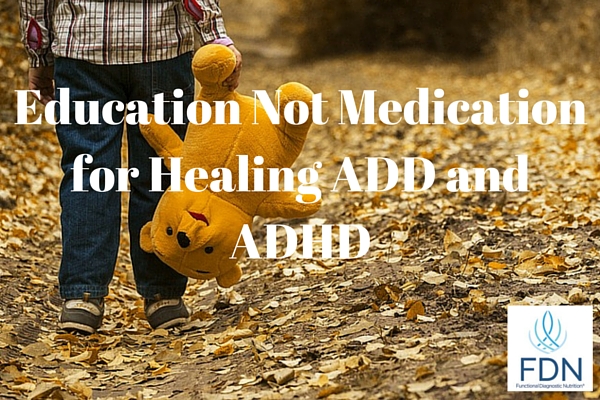The modern medical world has been treating both ADD and ADHD with medicine. But maybe we need to look at a different way healing ADD and ADHD than what we have been doing.
The notion that diet is a significant contributor to your overall wellness is pretty widely accepted. In recent times, people have really warmed up to the connection between nutrition and health.
However, the effect of diet on mental health disorders remains controversial in conventional circles. There is mounting research that directly links food and lifestyle choices to our ability to think, focus, and comprehend. In spite of this, there are still some who are not convinced. Despite studies that show how malnutrition, malabsorption, and food sensitivities lead to the type of inflammation that mediates depressive disorders, schizophrenia, and a variety of other unwanted mental or behavioral conditions including ADD and ADHD, sadly, nutrition is still overlooked in medical treatment for these conditions.
ADHD in children is a controversial subject.
Controversy is expected any time stimulants are the primary treatment method for children. These types of drugs are Class 2 narcotics, controlled substances, the same classification given to cocaine. They are addictive and very powerful. No one wants to medicate their children, but many parents aren’t given alternative choices. Adding to the controversy is the debate over whether ADD/ADHD is truly a disease caused by a genetic or biochemical imbalance in the brain, or if it is simply a collection of symptoms and behavior patterns caused by a malfunction or imbalance of some other origin that could be addressed without drugs.
Many children suffering from these disorders are tagged as “difficult” or “problem children”. And there is this societal belief that their behavior is primarily a parenting or discipline problem. The stigma is that these “lazy” parents are spoiling their kids with sugary cereals, then sending them off to school for the teachers to deal with. Parents, wanting to “do the right thing,” are desperate for a solution and sometimes look to the their doctors for advice. All too often, the doctor labels the child with ADD/ADHD based on the behaviors reported by the parents and teachers, then prescribes medication that, in fact, can help improve the behavior that teachers want in the classroom.
The solution may be drugs.
When a child has ADHD symptoms, we can hand them a Ritalin tablet and believe that has solved the problem. The reality is that the problem is just temporarily covered up.
Doctors simply do what they are trained to do. This involves giving the condition a label so that it can be medically treated. In the case of ADD/ADHD, if a child presents a certain number of symptoms, they earn the ADD/ADHD diagnosis. The most popular approved “treatments” for ADD/ADHD are medications like Ritalin and Adderall, which cause the troublesome symptoms to subside.
The National Institute for Health states that there is not yet a burden of proof to any specific pathophysiology connected to ADD/ADHD.
The FDA says that no distinctive pathophysiology has been established.
We do have solid evidence that diet, physical and emotional stress, anxiety, and lack of sleep and exercise can impact one’s ability to stay focused. Inflammation caused by environmental or biochemical stressors can also cause ADD/ADHD symptoms to surface. Wouldn’t it be logical then to take a look at these areas first, before prescribing addictive medications to children?
Attention Deficit Disorder (ADD) and Attention Deficient Hyperactivity Disorder (ADHD) really aren’t diseases, they are disorders, as the names imply. These disorders are a hodgepodge of symptoms such as hyperactivity, inattentiveness, squirming or fidgeting, lack of focus, and impulsiveness.
But these same symptoms may have other causes. For example, here are some of the symptoms of nutritional deficiency:
- Nervous system malfunction
- Memory Loss
- Hyperactivity
- Poor coordination
- Confusion
- Depression
- Irritability
Many of these symptoms are surprisingly similar to those associated with ADD/ADHD. With such high reliance on packaged, processed and fast food, isn’t it possible that some children are not receiving proper nutrition which may be causing these symptoms instead? Might a child who was suffering from a nutrient deficiency, either from lack of nutrients in the diet or a gut dysfunction impairing his ability to digest and absorb adequate nutrients, be mistakenly labeled as ADHD?
Why argue with science?
Research has drawn a direct correlation between a poor diet and symptoms associated with ADD/ADHD. Study after study shows significant improvement in ADD/ADHD children when placed on a toxin-free, gluten-free, sugar and additive-free, whole food elimination diet, while those eating a “standard diet” showed no change in their condition.
This is not to say that there is no possibility that a genetic mutation involving dopamine receptors could be the cause of those symptoms in some children. However, it is certainly true that the symptoms of ADD/ADHD are also caused by a vast array of other dysfunctions in the body.
A New Approach
When approaching ADD/ADHD, or any health complaint, an FDN trained functional health coach starts with the idea that symptoms are the last thing to surface when the body is breaking down. When trying to understand ADD/ADHD, we must ask, “Why is my child fidgeting, why doesn’t he listen, what is causing his behavioral and focus problems?”
Symptoms are only symptoms, not a diagnosis. They could be traceable to:
- Irritation/malfunction of the central nervous system
- Immune system dysfunction
- Hormones
- Digestion
- Detoxification
- Intestinal Barrier system
- Autonomic Nervous System imbalances
- Neurotransmitter imbalances
- Environmental toxins
- Food Allergies/Sensitivities
- Heavy metal toxicity
Medications offer a quick “solution” to the immediate problem. This comes at a cost. Since the symptoms are a result of breakdown somewhere in the body, and the drugs are simply covering those symptoms up, the breakdown continues without ever being addressed. Ignoring the underlying dysfunction can lead to many serious health conditions as the child gets older, including liver toxicity, hormonal imbalances, inability to digest and absorb food, chronic pain, fatigue, and skin conditions.
When you choose to work with a functional health coach you are making a conscious decision between just treating the symptoms (which is quick and easy) and doing some investigative work to find out what the true issues are that are causing the symptoms to appear. This is often a longer, more laborious and intensive process, but being able to restore your child’s health naturally is well worth it.








